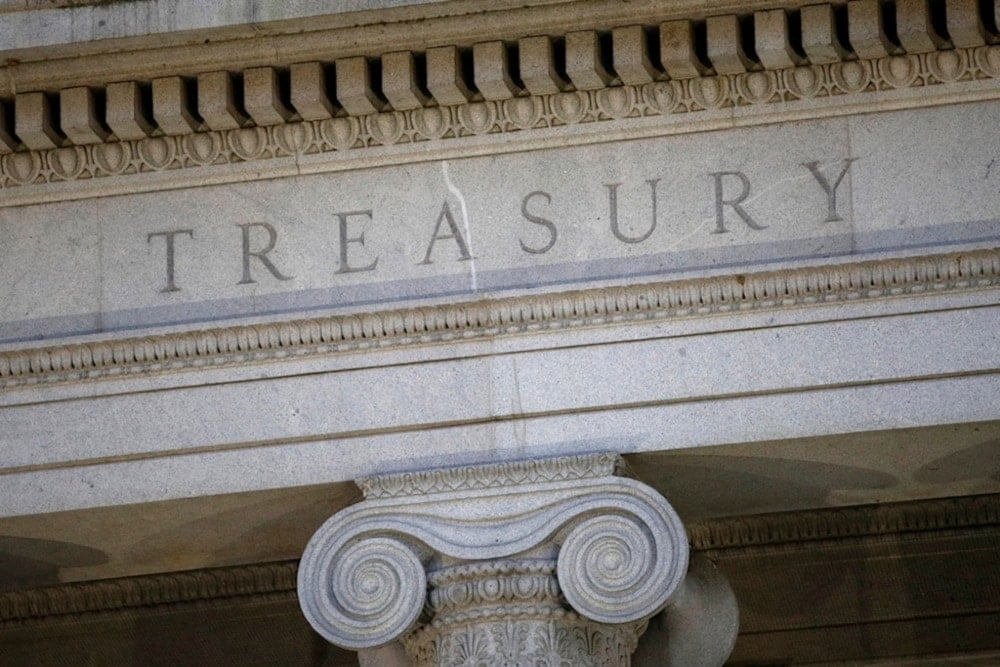Japan: Massive US Treasury holdings a negotiation tool for trade talks
Japan’s US Treasury holdings, the largest in the world, are being eyed as a strategic tool in Japan-US trade negotiations amid tensions over US tariffs and US treasury market sell-offs.
-

This June 6, 2019, a file photo shows the US Treasury Department building at dusk in Washington. (AP)
Japan is considering leveraging its more than $1 trillion in US Treasury holdings in ongoing trade negotiations with Washington, Finance Minister Katsunobu Kato suggested on Friday. While Kato did not explicitly threaten a sell-off, he acknowledged for the first time that these holdings could serve as a strategic tool in discussions with the United States.
Speaking in a television interview, Kato emphasized that the primary purpose of Japan’s US Treasury holdings, the largest globally, is to maintain sufficient liquidity to enable yen interventions when necessary. However, he added, "we obviously need to put all cards on the table in negotiations. It could be among such cards."
"Whether we actually use that card, however, is a different question," he clarified.
Analysts view Japan’s suggestion as a subtle but significant move in strengthening its negotiating power amid Japan-US trade negotiations. Martin Whetton, head of financial markets strategy at Westpac in Sydney, said, "Playing the card early, while the US bond market is in the minds of the administration after recent weeks, is a smart move. They don't have to do anything. But they can put themselves in a solid position to negotiate. It is, after all, the art of the deal."
Naka Matsuzawa, chief macro strategist at Nomura Securities in Tokyo, has a similar opinion, calling the holdings a potential "ace card" that could be used not only to influence yield curves in both countries but also to deflect other contentious demands, such as forced yen appreciation.
Bond yields are essentially interest rates, returns investors earn for lending money to the government through bond purchases, which rise when bond prices fall. Japan holds a large amount of US government bonds (US government debt), and if it sold a significant portion, it could raise US yields and disrupt markets, giving Japan leverage to resist US demands, and the yield curve reflects the broader financial impact of these strategic moves.
In contrast, speculation remains high that China could use its holdings as a "nuclear" option amid intensifying trade tensions, although no major liquidations have been observed. Data from the Treasury Department last month indicated a 3.4% rise in foreign holdings of US treasuries in February, with both Japan and China continuing to expand their positions.
Treasury market sell-off and tariff pressure
The remarks come in the wake of a significant global sell-off in the US Treasury market last month, triggered by US President Donald Trump’s April 2 decision to impose sweeping tariffs on major trade partners, including Japan. This sell-off, analysts suggest, may have influenced Washington's recent moves, including a 90-day pause on the Trump administration’s "reciprocal" tariff initiative.
Sources close to the White House believe Treasury Secretary Scott Bessent played a key role in this decision. Japan has faced previous accusations from Trump of deliberately weakening the yen to gain a trade edge, claims Tokyo continues to reject.
Japan’s leverage through US government debt
Japan and China, as the two largest holders of US government debt, are often at the center of market speculation, especially during periods of heightened yield volatility. While Japan is generally seen as a more cautious and aligned US ally, even vague suggestions about its Treasury strategy have global market implications.
Japan, which holds $1.1 trillion in US treasuries, the largest foreign stockpile, plays a pivotal role in international bond markets. Movements by Japanese investors are closely observed, often serving as an indicator of trends in US government debt.
Last week's US treasury sell-off by Japanese investors is one of the largest two-week outflows recorded since Japan began tracking such data in 2005.
Currency accusations and economic cooperation talks
During his recent meeting with Bessent, Kato said there was no discussion on currency targets or frameworks to manage exchange rate moves. Nonetheless, the strategic value of Japan’s holdings could factor into any future differences over currencies.
Meanwhile, Japan's top trade negotiator Ryosei Akazawa confirmed deepened dialogue on trade, non-tariff barriers, and economic security during the second round of talks with Bessent held in Washington. He noted plans to resume negotiations in mid-May.
昨日、米国のホワイトハウスに行きました。 pic.twitter.com/AhKjHHj3em
— 赤沢りょうせい (@ryosei_akazawa) April 18, 2025
Despite their potential as negotiation tools, large-scale sell-offs of US treasuries remain unlikely due to the risks involved. Analysts caution that such moves would not only destabilize markets but also inflict heavy losses on Japan and China themselves, undermining their own financial positions.
Nathan Sheets, former US undersecretary for international affairs and current global chief economist at Citi Research, stated, "The idea was an 'absolute non-issue in the past.' But countries have to use all the tools they have. The fact that we need to think about something like that shows the world we're in."

 5 Min Read
5 Min Read








